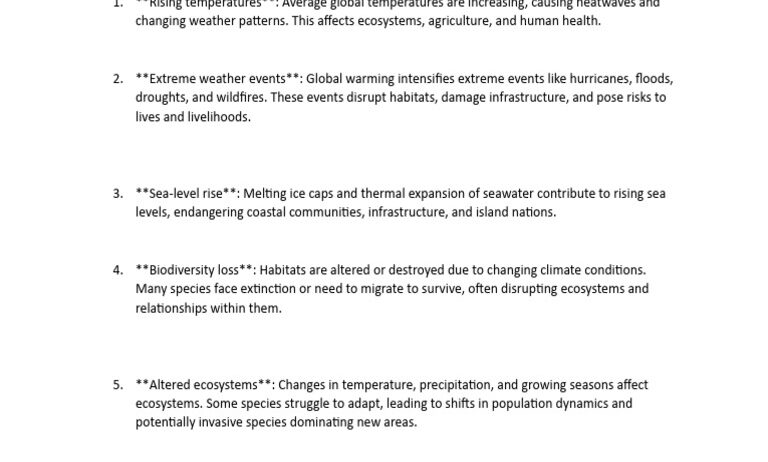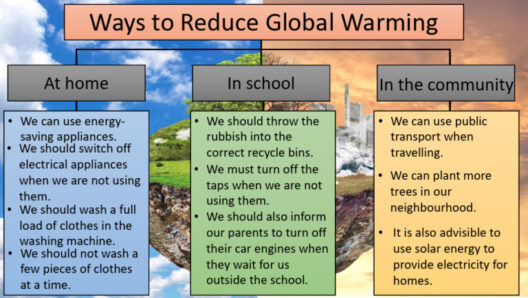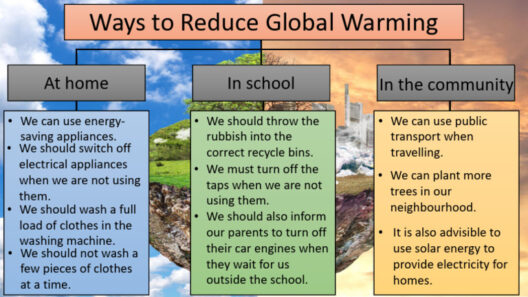As the world grapples with the accelerating effects of climate change, understanding your personal contribution to global warming is crucial. While it may seem like climate change is predominantly the result of industrial activity, individual behaviors play a significant role. By recognizing and modifying our daily actions, we can collectively mitigate our impact. How does one contribute to global warming? Let’s explore the nuances of individual responsibility and proactive engagement.
To begin with, it is essential to comprehend what global warming entails. At its core, global warming refers to the gradual increase in Earth’s average surface temperature due to the accumulation of greenhouse gases in the atmosphere, primarily carbon dioxide (CO2), methane (CH4), and nitrous oxide (N2O). These gases trap heat, leading to a plethora of environmental repercussions, including extreme weather patterns, rising sea levels, and biodiversity loss. Understanding this mechanism is fundamental to discerning how personal actions reverberate into larger ecological consequences.
One of the most significant aspects of individual contribution to global warming lies in energy consumption. The average household emits a substantial volume of CO2 from heating, cooling, and powering appliances. The burning of fossil fuels such as coal, oil, and natural gas remains the predominant energy source worldwide. By choosing to reduce energy consumption, individuals can directly lower their carbon footprint. Simple actions include switching off lights in unoccupied rooms, utilizing energy-efficient appliances, or employing smart thermostats. Additionally, consider the interstate implications of energy sources: opting for renewable energy, if available, can profoundly reduce emissions.
Transportation is another key area where personal habits significantly impact global warming. The combustion of gasoline in vehicles is a major source of CO2 emissions. Consider reevaluating your mode of transport. Can you walk, bike, or utilize public transportation instead of driving? Carpooling or choosing electric vehicles are sustainable alternatives worth contemplating. Even slight changes, like reducing unnecessary travel, can accumulate into a meaningful decrease in greenhouse emissions.
Food consumption patterns also bear considerable weight on global warming. The production and transportation of food contribute immensely to greenhouse gas emissions. For instance, meat and dairy farming are particularly resource-intensive, leading to lifelong emissions from methane released by livestock. Reducing meat consumption, embracing plant-based diets, or sourcing food locally can significantly lessen your contribution to global warming. Not only does this approach support local economies, but it also curtails the emission-heavy logistics associated with food transport.
Waste management is an often-overlooked contributor to global warming. Landfills produce methane, a potent greenhouse gas, as organic waste decomposes. By adopting a minimalist lifestyle that emphasizes reducing, reusing, and recycling, individuals can play a critical role in mitigating waste-induced emissions. Composting food scraps, avoiding single-use plastics, and purchasing products with minimal packaging can drastically lower your waste footprint. Each small effort, though seemingly inconsequential, compounds into a larger movement toward sustainability.
Moreover, embracing a mentality of conservation extends to water usage. Although water scarcity might not appear directly linked to global warming, the energy required for water treatment and distribution contributes significantly to emissions. Implementing water-saving strategies — such as fixing leaks, using water-efficient fixtures, and harvesting rainwater — provides a dual advantage of conserving both water and the energy utilized in its management. This holistic perspective is vital for fostering resilience against climate change.
Educating oneself and others about climate change is another substantial contribution to global efforts. Knowledge is profoundly empowering. By staying informed about local and global environmental issues, you can advocate for policies that address climate change on a larger scale. Engage in community discussions, participate in environmental groups, or volunteer for local conservation projects. By becoming an active participant in the discourse around climate change, you not only amplify your voice but also inspire others to consider their impact on our planet.
Your purchasing decisions wield power over industries and markets. Supporting businesses that prioritize sustainability, such as those leveraging renewable materials or ethical sourcing practices, sends a clear message about consumer demand. Conversely, patronizing companies that ignore environmental responsibility inadvertently fuels their fossil fuel-heavy practices. Make it a habit to research brands and products; consider their environmental policies before making a purchase. This approach engenders a market that values and respects ecological stewardship.
Tech-savvy individuals can explore the latest innovations designed to curtail emissions, such as smart home technology that optimizes energy usage or apps that track your carbon footprint. Technology offers tools that facilitate informed decisions, making it easier to align actions with sustainable practices. Experimenting with these innovations not only enhances personal awareness but contributes to a broader cultural shift toward sustainability.
Ultimately, the journey toward understanding and mitigating global warming begins with an introspective evaluation of one’s habits. Recognizing the intricate web of personal and collective behaviors that contribute to greenhouse gas emissions is essential. By transitioning from passive bystanders to active participants, we can collectively engender a substantial positive impact on the planet. The culmination of individual actions, no matter how small, can foster a transformative movement aimed at combating climate change effectively. Your choices matter; embrace the potential for change, and inspire others to join the fight for a sustainable future.








